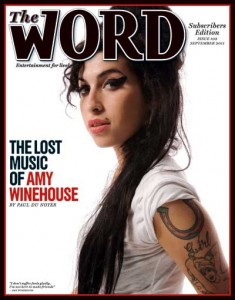The last word in music
It was the last word in music, and turned words into music. The WORD, which defied the decline in print media with wit, edge and artistry, is no more.
Thursday 26 July 2012

I'm listening to My Darling Clementine's spittoon-inspired 100,000 Words – just one of the usual 15 tunes that come free each month with the subscribers' edition of The WORD magazine – and I can't help but taste the bitter-sweet irony in this sad country song depicting loss and separation … how words just aren't enough. The song gives way to Cory Branan's The Freefall.
“What you have in your hands is, very sadly, the final edition of The WORD,” laments the magazine's editor Mark Ellen. “After nearly 10 years of publishing, it has eventually proved impossible for us to sustain the magazine,” he continues, blaming the wider economic climate, competition with free media and erosion of traditional advertising.
Shock was my first reaction when I read on the cover of The WORD August 2012 edition (issue 114) that it would be the final installment. Not car accident shock, but the feeling that something that should never happen just did. The magazine always struck me as an antidote to the steady decline in print media. When so many publishers were going web-first and looking at how to introduce pay walls, this cheeky, irreverent monthly dared to defy the trend, to stick a finger up at media pundits.
That this British magazine was also a breath of fresh air on the content side was pure bonus material. It called itself ‘More than a music magazine' and never failed to deliver an eclectic mix of book, film and music reviews, features, as well as an endless supply of clever factoids, ‘best-worst' comparisons, and various odd-spots and curios. And in every issue I'd look forward to pouring over the list of songs lovingly compiled into a veritable mixed tape from your brother's cool friend – The WORD staffers.
Where traditional music magazines labour to cover the very latest, hottest, biggest … I always got the feeling that The WORD had the inside edge. Sure, the pedigree of its writers helped open doors to interviews with some of the biggest rock legends on the planet, like Bruce Springsteen and The Cure, but these features were never fawning dross, and as often as not shared the cover with lesser-known mortals of music. Deliberate or not, it showed respect for the industry as a whole, not pandering to the age of celebrity.
The magazine really was about words and their context. Clever turns of phrases, subtle wit, and perhaps a few too many inside jokes (for real music heads only) set it apart from other monthly magazines for people who still read. The writing itself was crafted and usually very well sub-edited. The layout over the years was busy enough but not too crowded.
So where did it all go wrong? Well, there is the general industry malaise and the economic climate, as Mark Ellen suggests, but as an observer of the media's plight – I read about it in each National Union of Journalists' newsletter – I can only speculate that there were also some wrong turns made. Other glossies seem to be holding on despite the generally poor conditions for print media. But a flick through any of these stayers and you'll see full-page ads selling designer clothing or consumer electronics.
The WORD's advertising stable has been reared almost exclusively on music or music-related fare – record shops, concert promos, festivals, new releases, etc. – and often quarter-page nickel and dime stuff. Rarely did you see a serial advertiser or the high-priced advertorial packages, or those ads ‘facing content' (articles coinciding with ad spots) which tend to sell for more. This was great for readers who want genuine non-commercially tainted stories; not so great for the publishers.
I do recall a few issues back seeing a series of HMV advertorials, which must have brought in a few pennies, and I even wondered whether that was some kind of new move to drum up business, but then it didn't continue – maybe too many complaints or it didn't pan out financially. Now, with the benefit of hindsight, I see it was probably last-ditch chemo treatment for the cancer patient.
Oddly enough, perhaps one of the problems was not that The WORD wasn't niche enough to survive in today's tough media climate, but that it was too niche. With no insider knowledge of events, I can only surmise this was a topic of serious discussion over the years amongst the editorial board. Even the magazine's strapline hints at small adjustments to become more niche, followed by an attempt to reel in a bigger readership, then an apparent reversal. ‘More than a music magazine' became ‘Intelligent life on planet rock' which in turn opened up to become ‘Entertainment for lively minds' (ironically around the time of this new strapline it won Music Magazine of the Year). All this suggests the core survival instincts of old media players; using the skills they've honed over decades … all to no avail in this new digital époque.
The print world will no doubt be a more forlorn place without magazines like The WORD whose attention to detail and respect for words in all their form offer respite from (social) media pandering (or leading) to today's attention-deficit audiences. What “lively minds” want, or indeed need, is grown-up content in grown-up formats. We had that. Now we don't.
I for one will miss it, especially seeing Kate Mossman's cheeky smile each month in the pick & mix!!

